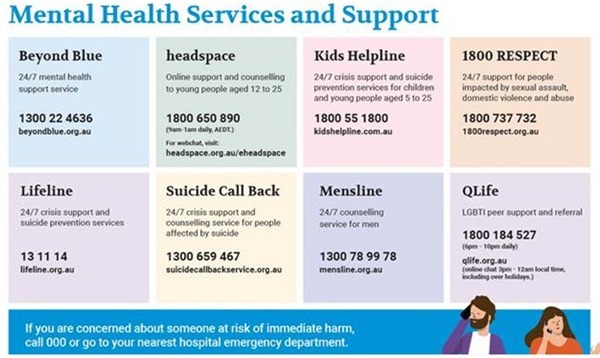Wellbeing News
Junior Secondary Guidance Officer – Anna Willis
Back to school anxiety: six tips to help your teen
Going back to school after the holidays can be a big deal. For some children, it means moving into a new classroom with a new teacher. Others will be going to a new school altogether. Change can be exciting, but it’s often scary, too. If your child is feeling fearful and anxious about the return to school, you may be unsure how to help them. This can be an upsetting and challenging situation for you as a parent or carer, too. Here are some steps to take to help your teen with their return to the classroom.
- Let your teen know you hear them
It might be tempting to dismiss your child’s fears with a quick reassurance that everything will be OK. But it is more helpful to let them know that you understand and believe them, and that you will work with them as they get back into the school routine and do whatever you can to support them. This can help your child move on from negative emotions and towards solving the problem with you.
- Find out what’s worrying them
There are various reasons why your child might not want to go back to school. They might be trying to avoid something negative: bullying, a difficult environment created by teachers, struggles interacting with their classmates or academic pressure. They might have neurodevelopmental issues, such as autism, ADHD or dyslexia, that make school difficult, or a mental health issue such as anxiety. Finding out what in particular is worrying them will help you work out a solution – perhaps with the assistance of a teacher or other professional.
- Let them know it’s OK to feel scared
If your family is experiencing back-to-school anxiety, both you and your child may be feeling a little bit inadequate and ashamed of these feelings. But this fear is not a sign of weakness. It’s an understandable challenge, with a genuine cause, that you and your child have the capacity to understand and overcome. By going through this challenge and facing it with the right support, you and your child can end up feeling more capable and more resilient.
- Focus on sleep
Sleep routines probably went out the window over the holidays, and everyone at home will struggle to deal with earlier bedtimes and morning alarms. Teenagers, in particular, will find it difficult – a shift in sleep patterns from puberty can push the time they feel ready to sleep later by as much as two hours. Unfortunately, though, this doesn’t reduce the amount of sleep that they need (about nine hours a night). But sleep is important for mood and academic performance. Try to be kind and compassionate with yourself and everyone else in the house, and see if you can all get to bed at least 15 minutes early. If you can’t manage this or if it’s already too late, there are other ways to improve sleep. Exercise during the day, cutting caffeine intake, reducing evening screen time, and even missing some extracurricular activities at the start of the school year might be helpful.
- Pay attention to your own mood
Try to reduce your own negative talk about the return to school. If you’re unhappy about going back to the school routine, then it’s likely your children will follow your lead. Try to avoid negative conversations, in real life or online, about going back to school. If you can’t manage to be positive, and there’s another adult in the house or family, you can ask them to support you by being positive and acting as a counterbalance to your anxiety or negative thoughts.
- Encourage optimism
Practice thinking optimistically with your teen. Before going to bed each night, you could both write down three things you are looking forward to the following day – seeing friends, an after-school club, a favourite meal. This can help you both balance out the negative emotions you might be feeling about the day ahead.
Author’s-Trudy Meehan, Lecturer, Centre for Positive Psychology and Health, RCSI University of Medicine and Health Sciences and Jolanta Burke, Senior Lecturer, Centre for Positive Health Sciences, RCSI University of Medicine and Health Sciences
Guidance Officer Anna Willis (Email : awill464@eq.edu.au)



